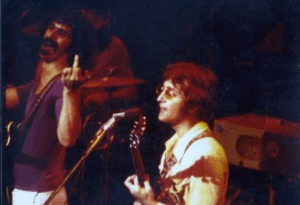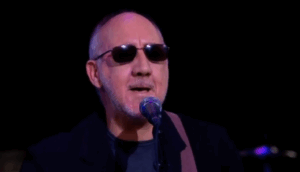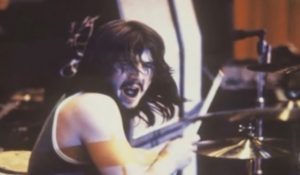15 Rare Facts To Celebrate Tom Petty’s Life

Tom Petty's Super Bowl Halftime show - NFL / YouTube
Tom Petty’s music was more than just a soundtrack to countless lives—it was a testament to his relentless dedication to his craft. Beneath the familiar melodies of “Free Fallin’” and “American Girl” was an artist who spent decades not only writing hit songs but also fighting for creative control and fair treatment in the industry. His battles with record labels and corporate interests were as defining as his music, ensuring that both he and other artists had the power to protect their work.
Beyond his well-documented career as a rock icon, there are parts of Petty’s life that remain lesser known. From an unexpected foray into acting to a quiet but fierce personal struggle, his journey was filled with moments that shaped him in ways many fans might not realize. His legacy extends far beyond the hits, touching on resilience, reinvention, and an unwavering belief in artistic freedom.
These rare and surprising facts offer a deeper look into the man behind the music. Whether he was taking a stand against unfair industry practices or lending his voice to an animated sitcom, Petty’s life was filled with stories that deserve to be remembered.
View this post on Instagram
He Played A Vital Role In Johnny Cash’s Unchained
One of the lesser-known highlights of Tom Petty’s career was his collaboration with Johnny Cash. In 1996, Petty and the Heartbreakers served as the backing band for Cash’s album Unchained, produced by Rick Rubin. At the time, Cash was experiencing a major career resurgence, and the album became a critical and commercial success, largely due to its raw and stripped-down approach.
A few years later, Cash returned the favor by covering Petty’s song “I Won’t Back Down.” The track, which originally appeared on Petty’s 1989 solo album Full Moon Fever, was reinterpreted by Cash with a deep, commanding vocal presence. Petty himself provided backing vocals on the recording, making it a unique moment in both artists’ storied careers.
Despite being an iconic collaboration between two legendary musicians, this partnership is often overshadowed by other high-profile collaborations in Petty’s career. However, for fans of both artists, Unchained remains a testament to the mutual admiration and musical chemistry shared between them.
View this post on Instagram
He Had A Short-Lived Acting Career
While Tom Petty is primarily celebrated as a rock legend, his brief ventures into acting are often overlooked. One of his most recognizable roles came in the animated series King of the Hill, where he voiced the character Lucky, a laid-back and somewhat dim-witted man who provided plenty of comic relief. His voice work on the show was widely praised for its charm and humor.
Petty also appeared on the big screen, most notably in the 1997 post-apocalyptic film The Postman, starring Kevin Costner. In a memorable scene, Costner’s character recognizes Petty, hinting at his past fame, to which Petty responds, “I was once—sort of.” This tongue-in-cheek moment delighted fans and showed Petty’s ability to poke fun at his celebrity status.
Although his acting career never took center stage, Petty’s appearances in both live-action and animated roles demonstrated his willingness to explore different creative avenues. His unique presence and laid-back demeanor made him a natural fit for these roles, adding yet another layer to his legacy.
View this post on Instagram
He Helped Another Rockstar Enjoy Drumming Again
Tom Petty played a crucial role in helping Dave Grohl return to drumming after the tragic loss of Nirvana frontman Kurt Cobain. In 1994, shortly after Cobain’s passing, Grohl found himself unsure of his future in music. During this difficult time, Petty extended an unexpected invitation—asking Grohl to play drums for the Heartbreakers on Saturday Night Live.
Initially surprised by the offer, Grohl recalled his reaction in an interview: “Someone from my management called and he says, ‘Hey, Tom Petty just called and wants to know if you’ll play drums with them on Saturday Night Live.’ I’m like, ‘What the fuck is he calling me for? He couldn’t find a good drummer?’” Despite his doubts, Grohl accepted the invitation.
The performance turned out to be a pivotal moment for Grohl. Not only did it mark his return to playing music in a high-profile setting, but it also reignited his passion for performing. While he ultimately chose to focus on his own band, Foo Fighters, Grohl later credited Petty with giving him the push he needed to move forward in his career.
View this post on Instagram
He Took A Tire Company To Court Over A Soundalike Song
Tom Petty was no stranger to fighting for artistic integrity, and one of his lesser-known battles came against tire company B.F. Goodrich in 1987. The company released a commercial featuring a jingle that bore a striking resemblance to Petty’s song “Mary’s New Car.” Furious at what he saw as an unauthorized imitation, Petty and his team took legal action against the company.
According to his manager, Tony Dimitriades, B.F. Goodrich had originally approached Petty’s camp with an offer to license the song, but they declined. “We turned them down—we told them absolutely no,” Dimitriades explained. “And now they come back and do an ad we feel is based on the same song.” Petty saw this as a direct attempt to deceive audiences and profit off his work without permission.
The lawsuit ended in victory for Petty, with the courts ruling in his favor and forcing B.F. Goodrich to pull the commercial from the airwaves. This case became yet another example of Petty’s unwavering stance on artistic ownership and his commitment to protecting musicians’ rights.
He Refused To Let His Album Be Overpriced
Petty’s well-documented battles with record labels often highlight his determination to stand up for both himself and his fellow artists. One of the most significant of these fights took place in 1981 when MCA Records planned to sell his album Hard Promises for $9.98—a dollar more than the standard price at the time. Petty refused to comply, arguing that his fans should not have to pay extra for his music.
In protest, Petty went as far as threatening to rename the album Eight Ninety Eight, directly calling attention to the price dispute. The standoff garnered widespread attention in the industry, with many artists and fans supporting Petty’s position. Eventually, MCA backed down and agreed to sell the album at the standard price.
This victory cemented Petty’s reputation as a staunch advocate for artists’ rights. His actions set a precedent for other musicians facing similar issues, proving that even in an industry dominated by corporate influence, artists could still fight back and win.
View this post on Instagram
He Was Taught Guitar By An Eagle
Well, not exactly an eagle. Following Tom Petty’s death, Eagles guitarist Don Felder revealed their longtime friendship—one that began when Felder gave a young Petty guitar lessons. At the time, Petty was playing bass in a local Florida band but wanted to learn guitar to take on a larger role in his group.
“Tom Petty came in one day, gosh, he must’ve been 12 or 13,” Felder recalled. “He had been playing bass in a band called the Epics, and he wanted to play guitar.” The young Petty had been fronting his band while playing bass but wasn’t satisfied with the setup. Felder’s lessons helped shape the future icon’s early understanding of the instrument.
As both musicians found success in their respective careers, their friendship endured. While they took different paths in the music industry, Felder’s influence on Petty’s formative years remained a little-known but vital piece of his story.
View this post on Instagram
He Won A Songwriting Credit On A Sam Smith Hit
In 2015, Tom Petty unexpectedly gained a songwriting credit on a major pop hit. Sam Smith’s “Stay With Me” was found to bear an uncanny resemblance to Petty’s 1989 classic “I Won’t Back Down.” Although the similarity was unintentional, Smith’s team quickly acknowledged it and agreed to credit Petty and Jeff Lynne as co-writers.
Smith’s representatives explained the resolution in a statement, saying, “Not previously familiar with the 1989 Petty/Lynne song, the writers of ‘Stay With Me’ listened to ‘I Won’t Back Down’ and acknowledged the similarity. Although the likeness was a complete coincidence, all involved came to an immediate and amicable agreement.”
The situation remained civil, and Petty himself took the matter in stride. Rather than viewing it as theft, he accepted the similarity as an accident, demonstrating his laid-back attitude toward the industry and his respect for fellow songwriters.
His Label Initially Rejected Full Moon Fever
Petty’s classic album Full Moon Fever is now considered one of the greatest records of the ’80s and ’90s, but at the time of its creation, his record label didn’t share that sentiment. MCA Records initially turned down the album, a decision that shocked Petty and his team.
“It hadn’t ever happened that way. That anyone at MCA felt they were in a position to respond as they did left Petty stunned,” a Petty biography explained. The rejection was a major setback, leaving Petty frustrated and uncertain about the album’s future.
Rather than dwelling on the setback, Petty used the break to record with the Traveling Wilburys, a supergroup featuring George Harrison, Roy Orbison, Bob Dylan, and Jeff Lynne. Warner Bros. Records later heard Full Moon Fever and immediately made him an offer. Although MCA eventually released the album under their contract with Petty, his work with Warner laid the foundation for a lasting relationship with the label.
View this post on Instagram
His House Was Set On Fire In An Arson Attack
In 1987, Tom Petty and his family experienced a terrifying ordeal when an arsonist set fire to their home. While eating breakfast, Petty suddenly smelled smoke, only to discover the house quickly being engulfed in flames. He attempted to fight the fire himself, but it was too intense—he later recalled that the hose melted in his hands as he tried to use it.
Although his family managed to escape unharmed, they lost nearly all of their belongings. Even more unsettling was the revelation that the fire was no accident. Investigators determined that someone had deliberately doused the staircase in lighter fluid, suggesting that the perpetrator intended to harm the family.
“We were shaken for years by it,” Petty admitted in Conversations With Tom Petty. “It’s sort of like being raped, I would imagine. It really took a long time. And it was 10 times as bad, because you knew that somebody just went and did it. Somebody tried to off you.” Despite investigations, the culprit was never found.
View this post on Instagram
He Met Elvis Presley At Age 11, And It Changed His Life
When Tom Petty was just 11 years old, his cousin took him to see Elvis Presley while the King of Rock ’n’ Roll was filming Follow That Dream in central Florida. The experience had a profound effect on Petty, shaping his destiny in music.
“He stepped out radiant as an angel,” Petty recalled in Conversations With Tom Petty by Paul Zollo. “He seemed to glow and walk above the ground. It was like nothing I’d ever seen in my life. At 50 yards, we were stunned by what this guy looked like. And he came walking right towards us.”
Petty was even able to meet Elvis briefly before the superstar returned to his trailer. That short encounter ignited his passion for rock ’n’ roll. Throughout his career, Petty credited meeting Elvis with giving him an obsession with music and setting him on the path to becoming a rock legend.
View this post on Instagram
He Dropped Out Of High School To Pursue Music
Inspired by Elvis Presley and The Beatles, Tom Petty began playing guitar at an early age. By 14, he had already formed his first band, The Sundowners. Determined to chase his musical dreams, he decided that the best way forward was to commit to music entirely, even if it meant making sacrifices along the way.
That commitment led him to drop out of Gainesville High School in Florida so he could focus full-time on his passion. During this time, he took on odd jobs to support himself, including working as a gravedigger and a groundskeeper at the University of Florida. Though the path wasn’t easy, Petty remained determined to make a name for himself in the industry.
His fortunes began to change when he joined Mudcrutch, a band that would later evolve into Tom Petty and the Heartbreakers. This move set the stage for his legendary career, proving that his bold decision to leave school had been the right one.
View this post on Instagram
He Almost Lost Millions In A Bad Record Deal
At the beginning of his career, Petty unknowingly made a financial mistake that could have cost him millions. When signing with Shelter Records, he agreed to give up 100% of his publishing rights for just $10,000. This deal meant that Shelter Records owners Leon Russell and Denny Cordell would have received all profits from his songwriting for the rest of his career.
Petty soon realized the gravity of his mistake and fought hard to regain control of his work. “I had no idea I’d never make money if I did that,” he admitted. Recognizing the unfair nature of the contract, he began looking for a way out before it could define his career.
When ABC Records, which distributed Shelter Records, was sold to MCA Records in 1979, Petty saw an opportunity to renegotiate. He successfully fought to be released from his contract, later reflecting, “I could work my ass off for the rest of my life, and for every dime I saw, the people that set me up would’ve seen 10 times as much.” His legal battle set an important precedent for artist rights in the music industry.
View this post on Instagram
He Voiced A Character On King of the Hill
One of Tom Petty’s most unexpected ventures was his role as a recurring character on the animated series King of the Hill. His involvement began in 2004 when the writers created a character named Lucky, who was described as looking like “Tom Petty without the success.”
The team decided to reach out to Petty, and he quickly became enamored with the role. According to showrunner Mike Judge, Petty had such a great time at the table read that he offered to voice Lucky anytime they wanted. Over the course of the show’s run, Petty appeared in 28 episodes between 2004 and 2009.
“We had all grown up on his music, that unique voice of his, and to have him as the voice of Lucky on King of the Hill was just wonderful,” Judge told Rolling Stone. “He was always a pleasure to work with—such a funny guy. He will be greatly missed.”
He Secretly Battled A Drug Addiction In The ’90s
Despite his outward success, Petty struggled with personal demons behind the scenes. His heroin addiction in the 1990s remained a well-kept secret until the release of Petty: The Biography, an unauthorized book published in 2015. The revelation shocked many fans and became one of the more widely discussed aspects of his life.
Biographer Warren Zanes explained why he believed Petty turned to heroin later in life. “That happens when the pain becomes too much and you live in a culture where people have reached in the direction of heroin to stop the pain,” Zanes said. “He had had encounters with people who did heroin, and he hit a point in his life when he did not know what to do with the pain he was feeling.”
Petty himself admitted, “You start losing your soul. You realize one day, ‘S—, I’ve lost myself. I’m hanging out with people I wouldn’t be seen with in a million years, and I have to get out of this.’ Using heroin went against my grain. I didn’t want to be enslaved to anything.” His struggle to overcome addiction was yet another example of his resilience and determination.
View this post on Instagram
He Knew His Final Tour Would Be His Last
Months before his unexpected passing, Petty had a feeling that his 40th-anniversary tour might be his last major run. In an interview with Rolling Stone, he shared his thoughts on the future of touring, acknowledging that the extensive schedule was taking a toll on him.
“I’m thinking it may be the last trip around the country,” he said at the time. “It’s very likely we’ll keep playing, but will we take on 50 shows in one tour? I don’t think so. I’d be lying if I didn’t say I was thinking this might be the last big one.”
His final tour concluded with a sold-out show at the Hollywood Bowl in Los Angeles on September 25, 2017. Just one week later, on October 2, Petty passed away unexpectedly at the age of 66. His final words on the road now carry an eerie weight, serving as a poignant reminder of a career well-lived and a legacy that endures.
View this post on Instagram














